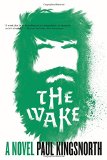Summary | Excerpt | Reviews | Beyond the book | Read-Alikes | Genres & Themes | Author Bio

The startling new novel from a brilliant young Irish novelist on the rise, who "has a sensational gift for a sentence" (Colum McCann).
In Donegal in the spring of 1945, a farmhand runs into a burning barn and does not come out alive. The farm's owner, Barnabas Kane, can only look on as his friend dies and all 43 of his cattle are destroyed in the blaze.
Following the disaster, the bull-headed and proudly self-sufficient Barnabas is forced to reach out to the community for assistance. But resentment simmers over the farmhand's death, and Barnabas and his family begin to believe their efforts at recovery are being sabotaged.
Barnabas is determined to hold firm. Yet his teenage son struggles under the weight of a terrible secret, and his wife is suffocated by the uncertainty surrounding their future. As Barnabas fights ever harder for what is rightfully his, his loved ones are drawn ever closer to a fate that should never have been theirs.
In The Black Snow, Paul Lynch takes the pastoral novel and - with the calmest of hands - tears it apart. With beautiful, haunting prose, Lynch illuminates what it means to live through crisis, and puts to the test our deepest certainties about humankind.
Lynch, author of the critically well-regarded Red Sky In Morning, seems uninterested in escape – in fact he's doubling down on his Irishness by employing both a style, and a genre, that can't help but summon the spirit of the auld sod. Lynch's literary voice and cadence have very strong echoes of James Joyce (lines from Dubliners and Portrait of the Artist came regularly to my mind as I was reading). Is [its] style is too self-consciously literary for some readers? Perhaps. The Black Snow is not a novel for people who want a story told in straight-forward, anodyne language. But for readers receptive to Lynch's bent prose, the novel confers a satisfying strangeness, its tilled linguistic landscape a garden of cockeyed delights...continued
Full Review
(807 words)
This review is available to non-members for a limited time. For full access,
become a member today.
(Reviewed by James Broderick).
The Black Snow is advertised as Paul Lynch's take on the "pastoral novel." Such a characterization presumes some familiarity with the term, though given the fairly infrequent use of the pastoral mode in contemporary fiction, it's likely some readers might be unfamiliar with precisely what that means – and even literary critics can't seem to agree, specifically, on what constitutes a "pastoral."
 Generally, a pastoral work of literature concerns itself with the rural countryside, and the people who inhabit it. The pastoral mode is well established in the Western literary tradition, having found its first full expression in the works of Theocritus, who wrote in the third century B.C.E. in ancient Greece. In his case, a pastoral ...
Generally, a pastoral work of literature concerns itself with the rural countryside, and the people who inhabit it. The pastoral mode is well established in the Western literary tradition, having found its first full expression in the works of Theocritus, who wrote in the third century B.C.E. in ancient Greece. In his case, a pastoral ...
This "beyond the book" feature is available to non-members for a limited time. Join today for full access.

If you liked The Black Snow, try these:

by Owen Sheers
Published 2016
An utterly stunning novel of love, loss, the insidious nature of secrets, and the transformative power of words. I Saw a Man fulfills the promise of Owen Sheers's acclaimed novel, Resistance.

by Paul Kingsnorth
Published 2015
"A work that is as disturbing as it is empathetic, as beautiful as it is riveting." - Eimear McBride, New Statesman
The whole problem with the world is that fools and fanatics are always so certain of themselves, and wiser people ...
Click Here to find out who said this, as well as discovering other famous literary quotes!